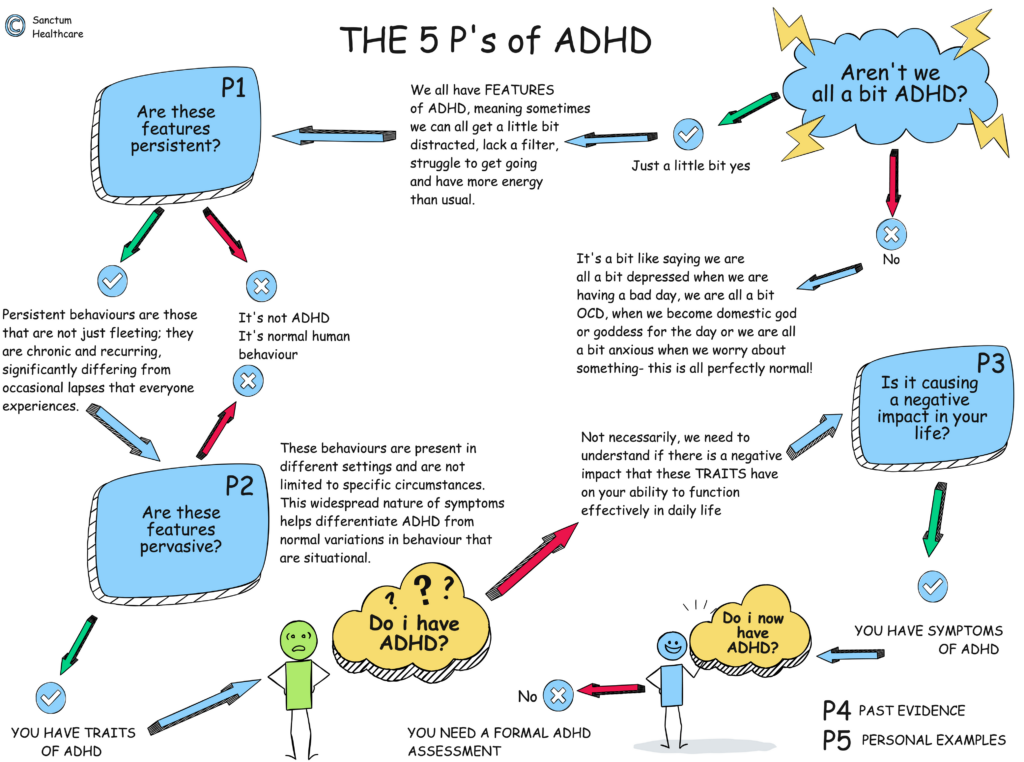Introduction to ADHD Diagnosis
Attention-Deficit/Hyperactivity Disorder (ADHD) is a common yet often misunderstood condition that affects both children and adults. Obtaining a proper diagnosis can be pivotal in managing symptoms effectively and improving overall quality of life. This article aims to demystify the process of getting an ADHD diagnosis, offering practical advice on navigating the healthcare system, what to expect during the evaluation, and how to prepare for a consultation.
Aren’t We All a Bit ADHD?
Unpacking Common Misconceptions in an ADHD diagnosis
“Aren’t we all a little ADHD?” It’s a phrase often tossed around casually, implying that everyone exhibits behaviours like distractibility or forgetfulness now and then. This sentiment attempts to normalize these challenges by suggesting that everyone shares them to some degree. However, such statements can be misleading and diminish the real struggles faced by individuals with ADHD.
ADHD is not merely being distractible or forgetful; it is a neurological condition with distinct brain differences. Studies show that the structure, volume, chemical activity, and communication pathways in the brains of people with ADHD differ significantly from those without this condition. These differences contribute to the various symptoms of ADHD, which include pronounced forgetfulness, distractibility, impulsivity, and an inability to focus that disrupt daily functioning.
These symptoms of ADHD exist on a continuum of typical human behaviour, yet they are far more severe and persistent in those with the condition. Unlike occasional forgetfulness or distraction, which can be attributed to a multitude of factors, ADHD symptoms stem from an inherent neurological basis.
Comparing Misuse of ADHD with Other Conditions
Comparing the casual use of “ADHD” to similar misuses of terms like “depressed” or “OCD” sheds light on a broader issue: the trivialization of mental health conditions. Saying “we’re all a bit depressed” on a bad day or “a bit OCD” when cleaning the house similarly undermines the seriousness of these conditions.
Depression is a clinical condition that affects mood, thinking, and daily functioning, while OCD (Obsessive-Compulsive Disorder) involves unwanted recurrent thoughts and repetitive behaviors. Like ADHD, these are not merely quirks or occasional states but persistent patterns that significantly impair individuals’ lives.
Talking about the reality of living in an ADHD diagnosis
For people living with ADHD, the symptoms are not just occasional inconveniences—they are pervasive and persistent, often leading to significant disruptions in personal, academic, and professional life. The impact of these symptoms is far-reaching, often resulting in lower earnings, increased debt, and struggles with performance in both school and work environments. Furthermore, individuals with ADHD face a higher risk of physical injuries and are generally unable to “course-correct” their behaviors as efficiently as others might manage.
Features vs. Symptoms: Understanding ADHD
The distinction between ADHD-related features and symptoms hinges on three key aspects: persistence, pervasiveness, and functional impairment.
Persistence of Behaviours
While almost everyone may experience brief periods of inattention or hyperactivity, the persistence of these behaviours is a core indicator of ADHD. For a behaviour to qualify as a symptom of ADHD, it must be consistently observable for at least six months. Persistent behaviours are those that are not just fleeting; they are chronic and recurring, significantly differing from occasional lapses that everyone experiences.
Pervasiveness Across Settings
Pervasiveness refers to the extent to which these behaviours occur in multiple settings, such as at home, school, work, or social situations. For individuals without ADHD, distractions might happen in specific situations or when under stress. However, for those with ADHD, these behaviours are present in various contexts and are not limited to specific circumstances. This widespread nature of symptoms helps differentiate ADHD from normal variations in behaviour that are situational.
Functional Impairment
Perhaps the most crucial aspect in differentiating ADHD from typical behavioral traits is the degree of functional impairment these behaviors cause. It is not merely the presence of distractibility or impulsivity but the negative impact these have on an individual’s ability to function effectively in daily life. Symptoms of ADHD lead to significant challenges, including academic and occupational difficulties, problems in social relationships, and managing daily responsibilities. This impairment must be significant and not just a minor inconvenience or a reflection of an individual’s personality or choices.
Real-Life Impact of ADHD Symptoms
For example, while many might procrastinate or occasionally forget tasks, an individual with ADHD might struggle to complete projects regularly, miss deadlines, or have chronic difficulties managing daily tasks that result in tangible consequences like job loss or academic failure. This level of impact is what health professionals assess when considering an ADHD diagnosis.
Conclusion
Understanding the difference between general behavioral features and true ADHD symptoms is essential for recognizing when to seek further evaluation. If behaviors are persistent, pervasive, and lead to significant functional impairment, it may be time to consult a professional. Recognizing these symptoms early can lead to better management and support, helping those with ADHD navigate their challenges more effectively.

NICE GUIDANCE FOR ADHD DIAGNOSIS
Introduction:
Receiving an accurate diagnosis of Attention-Deficit/Hyperactivity Disorder (ADHD) is pivotal for effective management and treatment. In the UK, the National Institute for Health and Care Excellence (NICE) provides comprehensive guidelines to ensure consistency and accuracy in ADHD diagnosis across different age groups. Understanding these guidelines can help individuals seeking a diagnosis, as well as their families, know what to expect from the diagnostic process and ensure that all necessary standards are met.
NICE Guidelines for ADHD Diagnosis
The diagnosis of ADHD should be thorough and multifaceted, according to the NICE guidelines.
Specialist Diagnosis
ADHD diagnosis must be made by a specialist—such as a psychiatrist, paediatrician, or other qualified healthcare professional—who has specific training and expertise in diagnosing ADHD. This diagnosis should be based on:
A Full Clinical and Psychosocial Assessment: This includes a discussion about the individual’s behaviors and symptoms across various domains of everyday life.
A Comprehensive Developmental and Psychiatric History: Understanding the individual’s past health, developmental milestones, and any previous psychiatric issues is crucial.
Observer Reports and Mental State Assessment: Reports from those who observe the individual in different settings (e.g., parents, teachers) and direct assessment of the individual’s mental state are necessary components.
Comprehensive Evaluation Tools: A diagnosis should not rely solely on rating scales or observational data. Tools like the Conners’ rating scales and the Strengths and Difficulties Questionnaire are valuable, but they should complement other diagnostic assessments, particularly in cases where there is uncertainty about symptoms.
Symptom Assessment Criteria:
For a valid ADHD diagnosis, symptoms of hyperactivity, impulsivity, and/or inattention must:
Meet Diagnostic Criteria: Symptoms should align with those described in the DSM-5 or ICD-11.
Cause Significant Impairment: There must be at least moderate psychological, social, and/or educational or occupational impairment observed in multiple settings.
Be Pervasive: Symptoms should occur in two or more significant settings, such as at home, school, work, or social environments.
Additional Considerations
ADHD should be considered across all age groups, adjusting symptom criteria to reflect age-appropriate behavior changes.
For children and adolescents, it is crucial to consider the impact of ADHD symptoms on their functioning, taking their perspectives into account during the diagnosis.
Conclusion:
Adhering to NICE guidelines ensures that the process of diagnosing ADHD is both thorough and tailored to each individual’s unique needs. These standards not only aid in achieving a correct diagnosis but also help in planning effective management strategies, considering any coexisting conditions, and the overall health of the individual and their family. For anyone undergoing an ADHD assessment, understanding these guidelines can provide reassurance that the diagnostic process is comprehensive and standardized, ensuring the best care and support moving forward.
How a specialist ADHD clinic can help
If you think you may have ADHD and have been experiencing burnout but have not yet been diagnosed, then speaking with an ADHD psychiatrist at a specialist ADHD clinic could be the path you need to manage your symptoms and lead a fulfilled and happy life.
Sanctum is a private ADHD clinic that specialises in assessing and supporting individuals with ADHD, helping them understand their diagnosis and ways they can use their ADHD as a positive force in their life. We believe that ADHD can be your superpower and we have a carefully selected, multi-disciplinary team of experts on hand who understand the unique set of circumstances their clients face.
If you would like to speak to Sanctum about obtaining an ADHD assessment, then you can get in touch here.



